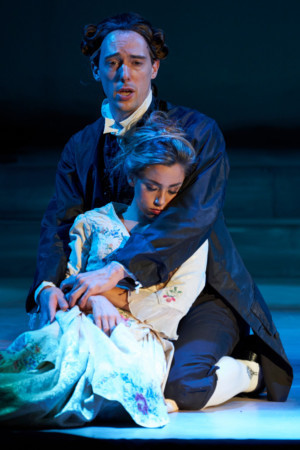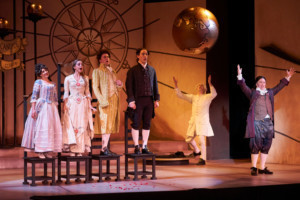Review: Union Avenue Opera Gives St. Louis a Brilliant CANDIDE

Run, don't walk, to see the brilliant Candide at the Union Avenue Opera! This is the opening production of their twenty-fifth festival season, and it is, for my money, the most wonderful of the many lovely shows they've done.
And the two young singers at the center of the story are pure gold, perfectly suited to the roles of Candide and Cunegonde, respectively, Jesse Darden and Brooklyn Snow. Their voices are superb, and visually they have surely stepped out of the illustrations in a fine edition of Voltaire's 1759 novella.
If you're not familiar with that satiric book shame on you. If you're not familiar with Leonard Bernstein's breathtakingly glorious musical version of it now's your chance to embrace this work of pure genius.
It's been called a "comic operetta" and in some ways it's a Broadway show--but it's far more challenging musically and intellectually than either of those genres. It has an astonishing variety of musical styles--ballads, arias, waltzes, a liturgical chant, a schottische, a gavotte, a polka, a tango and gorgeous expansive choral passages--and an overture that simply sweeps you off your feet into the frenzied pace of this story.
CANDIDE opened in 1956, with book by Lillian Hellman and lyrics by poet Richard Wilbur, with assistance from Stephen Sondheim, John La Touche, Dorothy Parker, Miss Hellman and Leonard Bernstein himself. It was not well received by the critics, who found Hellman's book too heavy-handed for Voltaire's light, deft satire. (She'd just been black-listed by Joe McCarthy's gang and she was eager to make the most of a scene with the Spanish Inquisition.)
In the '70's it was revived in several misguided adaptations (without Bernstein's participation), but in 1988 he worked with the Scottish Opera to prepare a final version more true to Voltaire's intent. It is this version which Scott Schoonover has chosen for his Union Avenue production.
We are in Westphalia in the early 18th century. Young Candide is the bastard nephew of the Baron Thunder-Ten-Tronck, the most important man in the region. (His house has a window and a door.) Candide is a naïve innocent. He, the Baron's children, (Cunegonde and Maximillian) and the maid, Paquette, are under the tutelage of the philosopher Dr. Pangloss.
Pangloss (a mockery of Leibniz) teaches that whatever pain and catastrophe, whatever barbarism and cruelty may occur in the world, God is omniscient and benevolent--so "all's for the best in this best of all possible worlds." Candide is in love with the beautiful Cunegonde--and this causes him to be literally kicked out of the castle. A series of very unfortunate events then unfolds.
There is war, raping and pillaging, flogging, the ravages of syphillis, hangings and burnings at the stake, murders, earthquakes. Again and again our friends are separated, presumed dead, then magically reunited. We travel to Lisbon, to Paris, to Spain, to Colombia in the New World--and to the utopia of El Dorado.
But nowhere can poor Candide find happiness. After so many demonstrations that other people are Hell we finally arrive in Venice--and ultimately, as the lovers are united, we learn that other people are Heaven, too--and that happiness awaits us in the simple life if only we do the best we can.
Brooklyn Snow is young, slender, beautiful, light-footed--the perfect image of a porcelain doll. And she has a remarkably beautiful soprano voice that so easily triumphs in the dazzling coloratura fireworks of Cunegonde's delicious aria, "Glitter and be Gay".
But Cunegonde is a little empty-headed; she doesn't really think a lot. She merely survives--and survives very well. The show is really Candide's story, and Jesse Darden fills the role with a heartbreaking earnestness and innocence. His voice is lithe, easy and warm and is capable of such true sweetness that he surpasses any recorded Candide I've ever heard. His Candide is from the Realm of Ideal Forms.
Both Darden and Snow are only at the brink of their careers, yet they are already so very fine. They are talents to be watched.
The wonderful Christine Brewer again blesses Union Avenue with her lovely voice. She plays The Old Woman--the daughter of a Polish Pope who, among other misfortunes, has survived unspeakable indignities at the hands of pirates. But she survives because she is so "easily assimilated".
Supporting roles are splendidly strong: Thomas Gunther is a shape-shifter indeed as he assumes the personae of Voltaire, Dr. Pangloss, Martin the cynic, and Cacambo (a South American servant). Singing beautifully, he gives sharp distinctions in manner and dialect.
Charlie Tingen sings Cunegonde's brother Maximillian with a great comic sense, a spritely physicality and an amusing touch of German accent. Gina Malone makes a bright, pert Paquette, and Christopher Nelson plays several villains and rogues most charmingly. (These include an archbishop, a sea captain, a gambler and a con-man.)
There is much impressive choral work--most especially in the memorable finale. This is, to me, the most movingly dramatic moment in all of musical theatre. The orchestra falls away, leaving the stage full of chorus singing, a capella, their commitment to "do the best we can . . . and make our garden grow!" (It is acceptable, at this point, to weep at the sheer humanity of it all.)
Stage director Annam aria Pileggi does wonders with a large cast on this small stage. Set designer C. Otis Sweezey presents a simple warm beige set with a great compass rose on the rear wall.
aria Pileggi does wonders with a large cast on this small stage. Set designer C. Otis Sweezey presents a simple warm beige set with a great compass rose on the rear wall.
Extensions of the compass radii reach out to meet black vertical lines elsewhere on the set--the lines of poles bearing golden balls, and of the high ladder-backs of several severe Spanish chairs. A great golden globe of the earth is center stage. Paintings adorn the sides of the proscenium: a sailing ship and a sea monster. Michael Sullivan's flexible lighting makes a variety of acting areas.
Costumer Teresa Doggett again does lovely work, giving everyone graceful period costumes.
The fine orchestra, under Scott Schoonover's direction, plays precisely and beautifully, and never dominates the singers. There are many opportunities for individual musicians to play small virtuoso cameos. The very beginning of the overture lacked a bit of the sheer assaultive power and racing tempo that I think is called for, but overall it was an overwhelmingly satisfying evening.
Bernstein's wonderful CANDIDE continues at the Union Avenue Opera through July 13.
Videos

